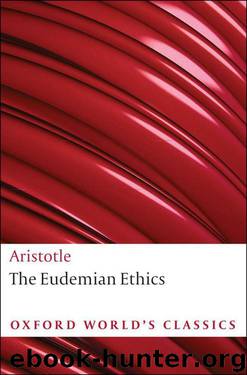The Eudemian Ethics (Oxford World's Classics) by Kenny Anthony

Author:Kenny, Anthony [Kenny, Anthony]
Language: eng
Format: epub, mobi
Publisher: Oxford University Press
Published: 2011-07-13T16:00:00+00:00
RELATION OF WISDOM TO UNDERSTANDING
What is the use of wisdom and philosophy?
12. One might wonder whether these virtues are of any use. Philosophical understanding does not focus on any of the things that will make a man happy, for it is not concerned with bringing
20
things into being. Wisdom does have that merit, but for what purpose is it necessary? The sphere of wisdom is the things that are just and noble and good for human beings, and these are the characteristic activities of a good man: but if the virtues are states of character,
25
mere knowledge of these things will not make us any more likely to do them. The case is the same as with health and physical fitness: mere knowledge of medicine or gymnastics will not make us better able to do what is healthy and fit—in the sense of manifesting, rather than procuring, these physical states. But if you say that wisdom is not a matter of knowing things but aims to make a man good, then wisdom will be no use to those who are already virtuous. Nor will it
30
be useful to those who lack virtue: it will not matter whether they have wisdom themselves as long as they listen to others who do have it. That will be enough for us, as it is in the case of health: we wish to be healthy, but we do not learn medicine. Furthermore, it would seem odd if wisdom, a virtue inferior to philosophical understanding, is to be put in charge of it in the way that an art that has a product governs and prescribes everything about it.
These, then, are the issues we must discuss: so far we have done
35
no more than set out the problems.
First of all, let us say that these characteristics, even if neither of
1144a
them produces anything, must be desirable in themselves, because each of them is a virtue of one of the two parts of the soul. Secondly, they are indeed productive: not like medical skill in relation to health, but like health itself.* It is thus that understanding is productive of happiness: for, being a part of the totality of virtue, its
5
possession and its exercise make a man happy. Again, our task is achieved only in accordance with wisdom as well as with moral virtue; for virtue makes the target aimed at correct, and wisdom makes the means correct.* (The fourth part of the soul, the nutritive part, has no such virtue; for there is nothing that is in its power to
10
do or not to do.)
What of the objection that wisdom makes us none the more likely to do what is noble and just? Let us go back a little and start from the following principle. We note that in some cases men who do just acts—for instance, those who act as the law ordains either unwillingly or in error or for some other reason and not because of
15
themselves—are not thereby just men, though indeed they do what they ought and all that a virtuous man should.
Download
The Eudemian Ethics (Oxford World's Classics) by Kenny Anthony.mobi
This site does not store any files on its server. We only index and link to content provided by other sites. Please contact the content providers to delete copyright contents if any and email us, we'll remove relevant links or contents immediately.
| Africa | Americas |
| Arctic & Antarctica | Asia |
| Australia & Oceania | Europe |
| Middle East | Russia |
| United States | World |
| Ancient Civilizations | Military |
| Historical Study & Educational Resources |
Alexander the Great by Robin Lane Fox(1177)
Mythos (2019 Re-Issue) by Stephen Fry(1170)
Antigone Rising: The Subversive Power of the Ancient Myths by Helen Morales(945)
On Sparta (Penguin Classics) by Plutarch(925)
The Classical World: An Epic History From Homer to Hadrian by Robin Lane Fox(886)
The Last Days of Socrates by Plato & Christopher Rowe & Plato(884)
Persian Fire by Tom Holland(825)
Cicero by Anthony Everitt(777)
The Athenian Constitution (Classics) by Aristotle(772)
The Greek World(698)
Antigone Rising by Helen Morales(657)
The Eudemian Ethics (Oxford World's Classics) by Kenny Anthony(646)
The Riddle of the Labyrinth(628)
The Story of the Greeks (Yesterday's Classics) by Guerber H. A(620)
Lords of the Sea: The Epic Story of the Athenian Navy and the Birth of Democracy by John R. Hale(616)
Guide to Greece by Pausanias(606)
The End of the Bronze Age by Robert Drews;(591)
The Homeric Hymns (Penguin Classics) by Homer(575)
Astrology and Religion Among the Greeks and Romans by Cumont Franz(570)
